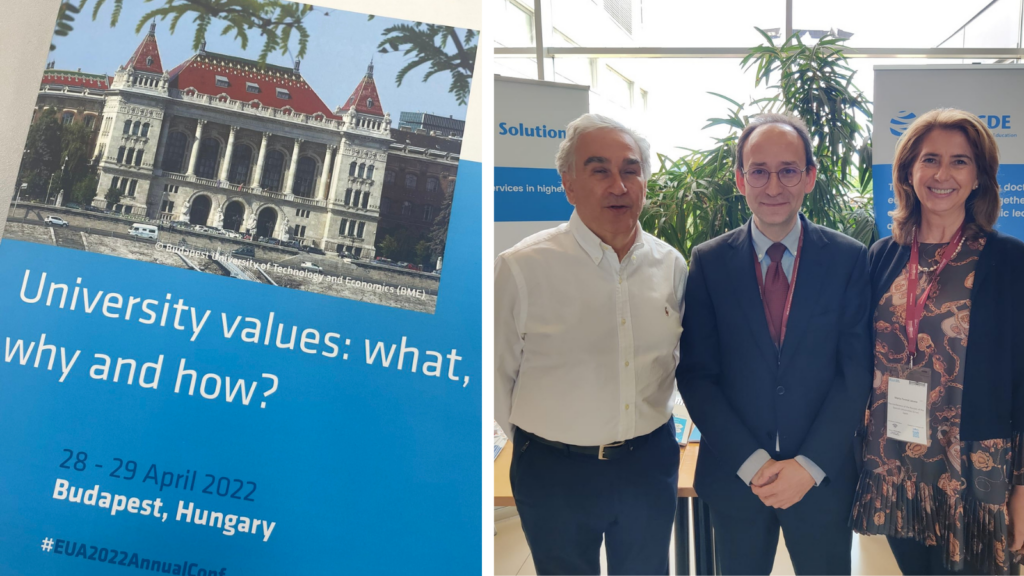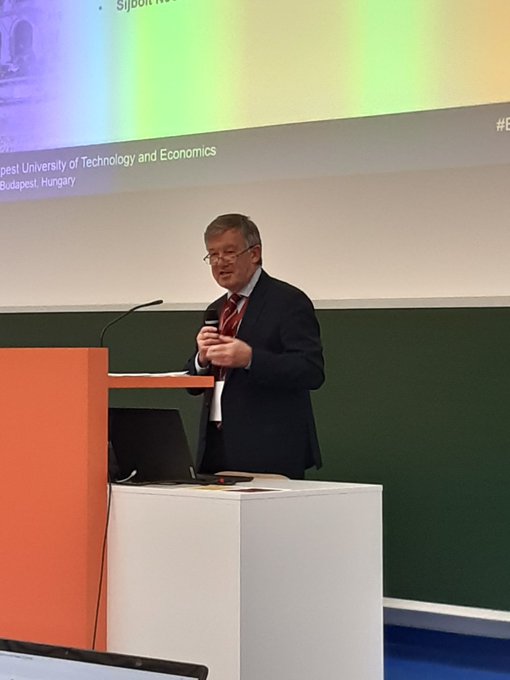
Budapest, April 27-29, 2022. Crue Spanish Universities participated in the Council and General Assembly meetings of the European University Association (EUA), as well as in its 2022 Annual Conference, held at the Budapest University of Technology and Economics (Hungary) from the 27th to the 29th April 2022. Crue was represented by Deputy Vice President, Prof. José María Sanz Martínez and Secretary General, María Teresa Lozano Mellado. In addition, Crue’s Vice President and Rector of the Ramon Llull University, Prof. Josep Maria Garrell i Guiu, participated as a member of the EUA Board.
The Russian invasion of Ukraine opened the Council meeting on Wednesday 27. EUA President, Prof. Michael Murphy, and Secretary General, Amanda Crowfoot, presented an update on the initiatives carried out by the EUA in relation to this war. Specifically, Murphy reported that the European Commission is working on a program to welcome Ukrainian academics, at the request of the partners of the Inspireurope project, of which the EUA is a part.

During the EUA Council meeting, attendees addressed several ongoing initiatives. On one hand, Alexander Hasgall, Head of the EUA Council for Doctoral Education (EUA-CDE), communicated the intention of developing, in the coming months, a position on the future of doctoral education in Europe and presented an analysis of the current context. As he explained, it is a heterogeneous scenario, with doctoral programs with different credits, as well as a diversity of supervision models, admission criteria, funding opportunities, duration of the programs and/or legal frameworks, among others. After this analysis, the representatives of the rectors’ conferences shared some ideas that will serve as a starting point for preparing this position paper in the coming months.
Another issue that was addressed at the EUA Council was the European Strategy for Universities (ES4U) published by the European Commission in January 2022 and the adoption, on April 5, of the Council conclusions on the European Strategy for Universities and the Council recommendation on building bridges for effective European higher education cooperation. The attendees agreed that the development of joint European programs will be essential for the integration of the European Higher Education Area and they were in favour of the EUA continuing to emphasise the integration of the European Education and Research Areas, since universities are the only institutions that bring both together.
Finally, the Council of the EUA addressed the status of the research assessment reform initiative promoted by the European Commission and in which the association participates as part of the drafting team. Stephane Berghmans, Director for Research and Innovation at EUA, reported that, after collecting the contributions of the institutions that participate in the process, including those put forward by Crue Spanish Universities, they hope to have a new draft on May 16 so that it can be debated at the next General Assembly of stakeholders of the process scheduled for May 19.
After the Council meeting, the EUA General Assembly met, during which the association’s 2021 annual report was presented.
University Values
On April 28 and 29, the EUA Annual Conference was held under the title University values: what, why and how?. The aim was to address the values that form the missions and strategic objectives of universities in Europe and on how these can guide their activities. This debate arises from the need for universities to safeguard academic freedom or university autonomy in contexts in which democratic values are questioned. During the sessions, attendees reflected on the need for universities to strengthen their social responsibility, promote a culture of academic integrity and establish collaborations that serve to advance their strategic objectives without forgetting their values. In this way, they can continue to be environments that are characterized by their openness, freedom of thought and scientific rigor.
During the different sessions, the very concept of academic freedom was addressed. Participants agreed that this should not be conceived solely as freedom of expression, but that it should also include freedom of access to Science and Education as a fundamental element.
The Conference ended with the presentation of the preliminary results of the Autonomy Scorecard review that is being carried out by EUA. As explained by EUA’s Deputy Director for Governance, Funding and Public Policy Development, Enora Bennetot Pruvot, these results show «multiple pressures towards university autonomy in Europe» that come from funding, contracting models, from authorities or from political interests of all stakeholders involved.

